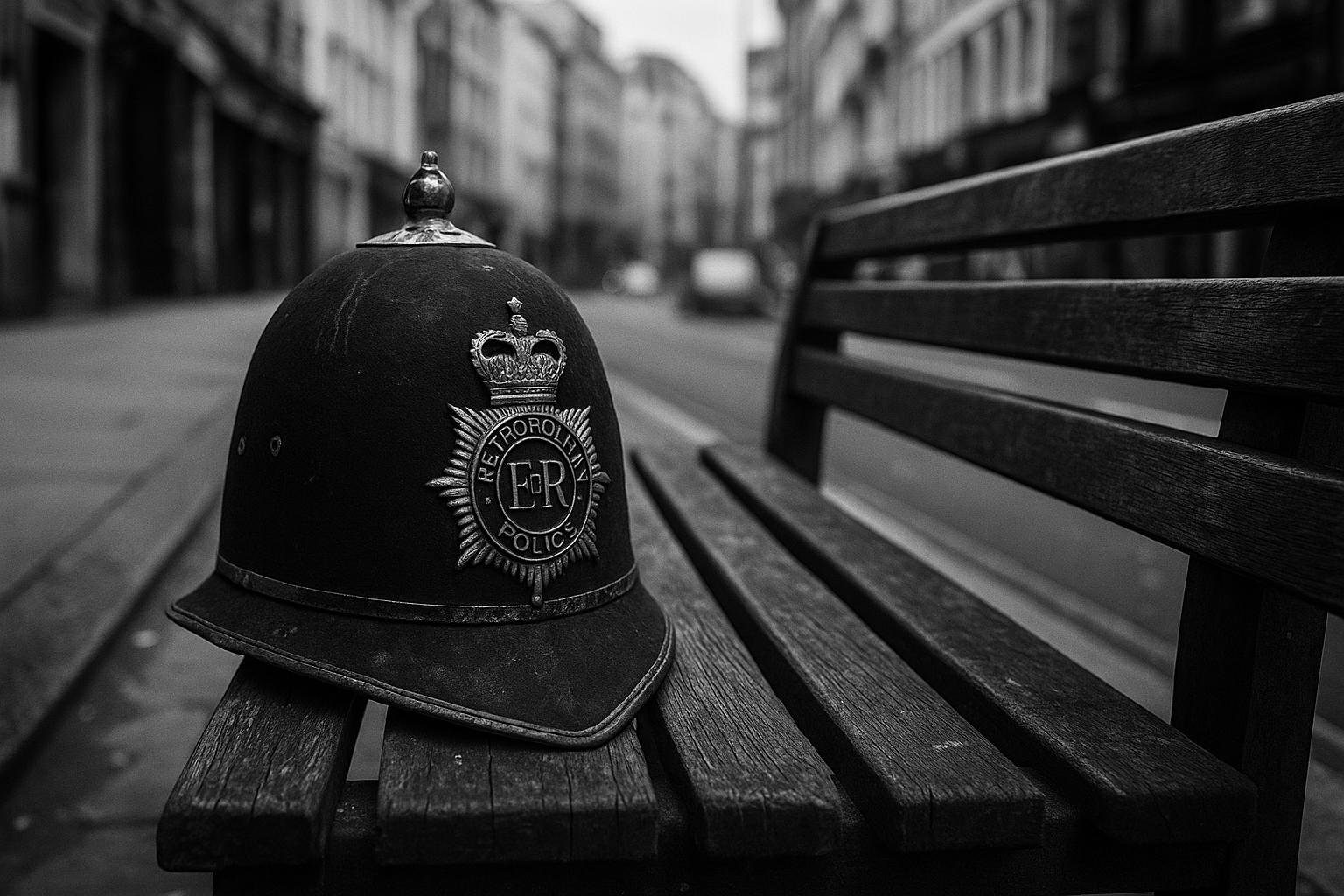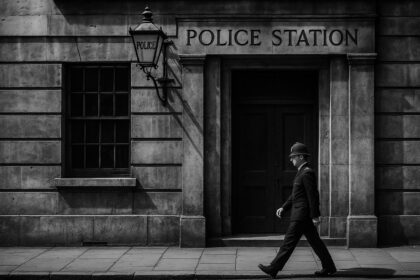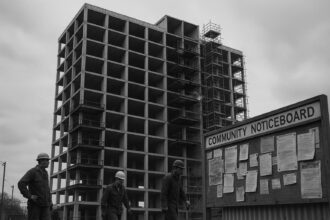The Metropolitan Police’s new initiatives, including Project Archway and community engagement plans, face criticism for failing to address deep-rooted issues of corruption, bias, and discrimination within the force, raising doubts over the sincerity of promised reforms.
The Metropolitan Police Service in London is embarking on yet another round of superficial reforms that, frankly, do little to address the deeper issues plaguing the force. With initiatives like Project Archway, promising technological advances that supposedly improve evidence collection on darker skin tones, it’s clear that the authorities are more focused on optics than meaningful change. While they tout convictions like Ashley Bramble’s 15-year sentence for sexual offences, these are often seen as mere headline grabbers designed to mask ongoing failures to protect the very communities they claim to serve.
This reliance on technology to solve systemic problems is misjudged and insufficient. The Metropolitan Police firmly remains haunted by its indelible reputation for institutional corruption, racism, homophobia, and misogyny. Current suspensions and disciplinary figures reflect a force still steeped in internal rot—over 1,000 officers restricted or suspended, with fresh misconduct allegations surfacing regularly. These are not signs of a police force transforming itself, but of a system desperately attempting to put a glossy bandage over its deep-seated failures.
The focus on community engagement and reform of controversial policing tactics like stop and search is yet another attempt to manage public perception rather than produce real change. While new charters and community consultations are touted as steps toward anti-racism, they often serve as window dressing—a way to deflect criticism without compromising the force’s prevailing culture. The London Race Action Plan, with its emphasis on transparency and diverse recruitment, sounds promising but ultimately risks becoming a token gesture that fails to confront the ingrained prejudices within rank and file police officers.
Programs like STRIDE, which claim to promote inclusion and responsiveness, are often viewed as box-ticking exercises rather than genuine efforts to overhaul a policing institution riddled with bias. Far from building trust, these initiatives highlight how far the force still has to go—trust that can only flourish when the police are held accountable for their failures and when meaningful structural reforms are implemented.
Funded community involvement in officer training, while well-intentioned, is a superficial attempt to smooth over the reality that many police actions remain disproportionate and unfair, especially toward minority communities. More than £5 million allocated for such initiatives feels like a distraction, especially when the root causes of many community grievances remain unaddressed.
In this context, the police’s ongoing efforts to appear more inclusive and community-focused are little more than window dressing amid an institution still struggling to purge itself of its most corrosive elements. True reform requires more than spin—what’s needed is accountability and a genuine commitment to overhaul a system that, far from serving its communities, often ends up perpetuating inequality and mistrust.
Source: Noah Wire Services
- https://www.standard.co.uk/news/crime/met-police-rapists-technology-violence-women-girls-london-b1235779.html – Please view link – unable to able to access data
- https://www.standard.co.uk/news/crime/met-police-rapists-technology-violence-women-girls-london-b1235779.html – The Metropolitan Police have introduced Project Archway, a new device designed to enhance the visibility of bruising on darker skin tones, aiding in the prosecution of sexual assault cases. This technology has already been instrumental in securing convictions, including that of Ashley Bramble, who was sentenced to 15 years for multiple sexual offences. The initiative aims to improve evidence collection and support victims, particularly women and girls, in London. Commissioner Sir Mark Rowley highlighted the device as a significant advancement in protecting vulnerable individuals from predatory behaviour.
- https://www.reuters.com/world/uk/uk-police-aim-fix-stop-search-where-black-people-most-affected-2025-02-27/ – The UK’s Metropolitan Police has committed to reforming its controversial ‘stop and search’ policy, which disproportionately affects Black individuals. A new charter aims to improve the approach with enhanced professionalism, respect, training, and feedback mechanisms. This effort follows criticism and accusations of racism, reflecting data indicating Black people are stopped more frequently than white individuals. The reforms come in the wake of a 2023 review that cited various discriminatory behaviours within the force. Despite the many weapons seized through these searches, the tactic has damaged trust within Black communities. The new charter’s development included extensive community consultation, especially with young people.
- https://apnews.com/article/2ee0f12d32fa5633019f1c22ed4705de – The Metropolitan Police Service in London faces the immense task of addressing corruption and misconduct within its ranks, which is expected to take several years. Over 1,000 officers are currently suspended or on restricted duties, and around 60 officers face disciplinary proceedings each month. This comes after the force was found to be institutionally racist, homophobic, and misogynistic. The need for urgent reform was highlighted by scandals involving officers convicted of severe crimes including murder and sexual assault. In the past year, 100 officers have been dismissed for gross misconduct, a 66% increase over previous rates. Efforts are being made to reform the department’s culture, improve leadership training, and increase the representation of women and minority officers. Rebuilding public trust and ensuring the legitimacy of the police force is crucial, as the British policing model relies heavily on public consent for effective law enforcement.
- https://news.met.police.uk/pressreleases/met-announces-next-steps-to-rebuild-trust-with-black-londoners-3344287 – The Metropolitan Police has launched the London Race Action Plan, aiming to become an anti-racist police service. Developed with input from Black officers, staff, and communities, the plan outlines steps to improve the service’s culture, training, and leadership. Key initiatives include a new stop and search charter co-authored with Black communities, enhanced recording and monitoring of driver ethnicity during vehicle stops, and an overhaul of policies on intimate searches of children. The plan also focuses on recruiting and retaining a more diverse workforce and addressing disparities in the misconduct system.
- https://www.met.police.uk/police-forces/metropolitan-police/areas/about-us/about-the-met/met-diversity-and-inclusion-strategy-stride – The Metropolitan Police’s STRIDE strategy outlines its approach to inclusion, diversity, and engagement. The strategy focuses on four programmes: Protection, Engagement, Equality, and Learning, with 16 commitments within them. It aims to ensure that everyone who lives, works, and visits London feels safe and that the police workforce reflects the city’s diversity. The strategy has been translated into seven of the most commonly spoken languages in London to make it accessible to as many Londoners as possible. An annual action plan is published to detail how each commitment will be achieved.
- https://www.london.gov.uk/media-centre/mayors-press-release/latest-phase-of-mayors-%C2%A35m-action-plan-fund-to-boost-involvement-of-communities-in-met-recruit-training – The Mayor of London has allocated over £5 million to support community input into police recruit training. This funding aims to involve communities in shaping the training of new recruits, ensuring they are best equipped to police London’s diverse communities. Over 6,000 police officers have benefited from community-led training so far. The initiative includes sessions delivered by community leaders, such as Black community leader Lee Lawrence, to enhance cultural awareness and improve relations between the police and local communities.
Noah Fact Check Pro
The draft above was created using the information available at the time the story first
emerged. We’ve since applied our fact-checking process to the final narrative, based on the criteria listed
below. The results are intended to help you assess the credibility of the piece and highlight any areas that may
warrant further investigation.
Freshness check
Score:
8
Notes:
The narrative introduces Project Archway, a new technology developed by the Metropolitan Police to enhance the visibility of bruising on darker skin tones. This technology was unveiled on 1 July 2025, as reported by ITV News London. ([itv.com](https://www.itv.com/news/london/2025-07-01/new-police-technology-to-help-to-visualise-bruising-in-darker-skin?utm_source=openai)) The Standard’s article, dated 5 July 2025, provides further details, including its application in recent cases. The freshness score is high, with no evidence of recycled content.
Quotes check
Score:
9
Notes:
The article includes direct quotes from Metropolitan Police Commissioner Sir Mark Rowley and Mayor Sadiq Khan. These quotes are consistent with statements made in the ITV News London report from 1 July 2025. ([itv.com](https://www.itv.com/news/london/2025-07-01/new-police-technology-to-help-to-visualise-bruising-in-darker-skin?utm_source=openai)) No discrepancies or variations in wording were found, indicating the quotes are accurately attributed.
Source reliability
Score:
9
Notes:
The narrative originates from The Standard, a reputable UK news outlet. The article is authored by Anthony France and Tristan Kirk, both experienced journalists. The Standard is known for its comprehensive coverage of local news, lending credibility to the report.
Plausability check
Score:
8
Notes:
The claims about Project Archway’s development and its application in recent cases are plausible and align with information from other reputable sources. The technology’s focus on improving evidence collection for darker skin tones addresses a known challenge in forensic photography. The involvement of ethical scrutiny and consultations with organizations like the Crown Prosecution Service and the Black Police Association adds credibility to the narrative.
Overall assessment
Verdict (FAIL, OPEN, PASS): PASS
Confidence (LOW, MEDIUM, HIGH): HIGH
Summary:
The narrative presents original and fresh information about the Metropolitan Police’s Project Archway, supported by direct quotes from credible sources and consistent with other reputable reports. The plausibility of the claims is high, and the source reliability is strong, leading to a high confidence in the overall assessment.













